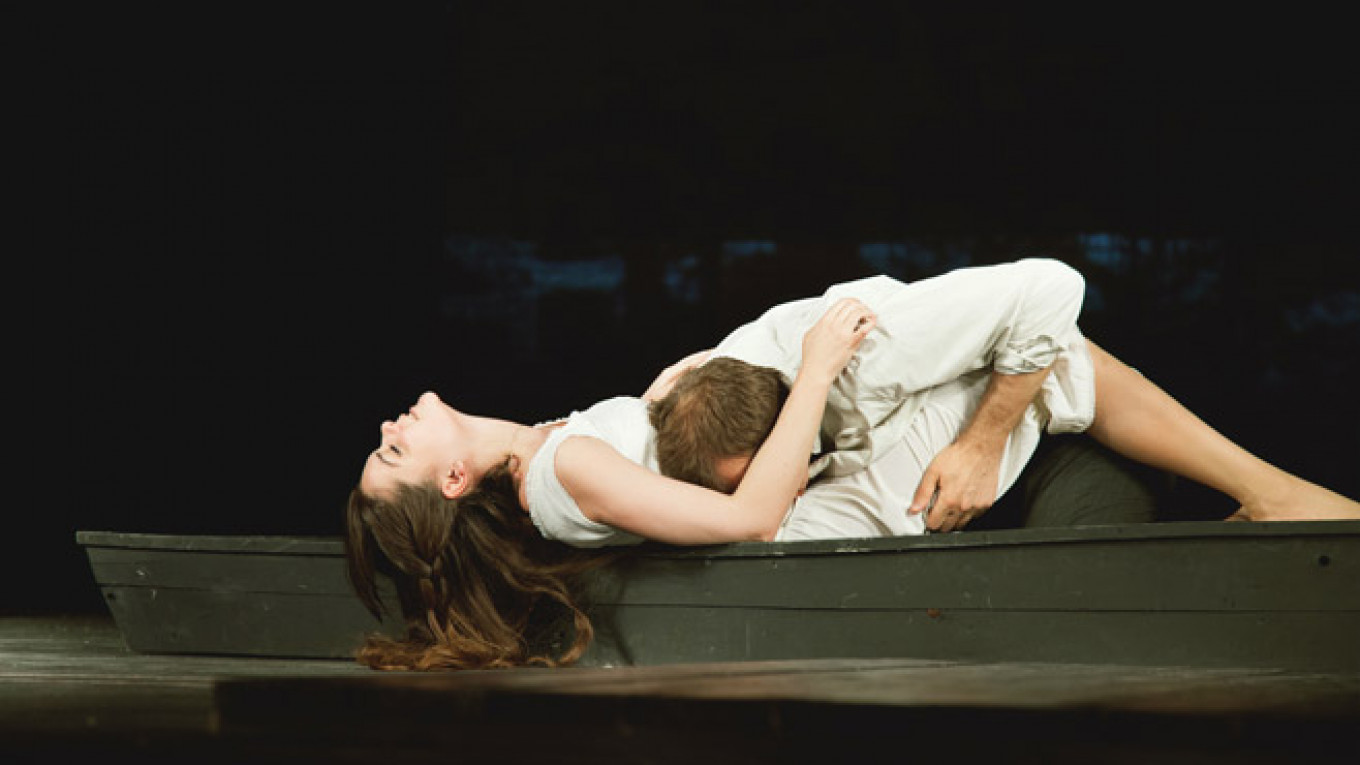It is a paradox that director Lev Erenburg rather quietly moved into the first rank of Russia's theater directors. His bold, dynamic shows are anything but tranquil.
And yet, Erenburg's journey has been deliberate, even slow. He founded the Little Drama Theater in St. Petersburg in 1999 and began touring his work to Moscow shortly thereafter. He had a major impact in the so-called provinces with tours and productions. His raging rendition of Alexander Ostrovsky's "The Storm" for the Magnitogorsk Drama Theater won a Golden Mask award in 2008.
He debuted in Moscow at the Chekhov Moscow Art Theater in 2012 with a dramatization of Fyodor Dostoevsky's "Crime and Punishment," and now returns to the Russian capital with Ostrovsky's "Without a Dowry" at the Mayakovsky Theater.
Erenburg belongs to the rich tradition of Russian auteur directors who ground their work in psychology, deep detail and a strong will to recreate the known in unexpected surroundings.
In "Without a Dowry," Ostrovsky's perennial favorite about the strong-willed, poor young Larisa who is at the mercy of a gold-digging mother and a town full of unscrupulous suitors, Erenburg pulled out the stops. He cut some scenes, moved others around, while occasionally taking dialogue from one character and handing it to others. He developed remaining scenes in ways no one would predict.
Take for example the sleazy suitor Moky Knurov, played by Yury Lakhin. His eating habits — fastidious to the point of obsession — mark him as someone that anyone would want to avoid.
Consider the huge, rubbery, wiggly sturgeon that Larisa's former lover Paratov, played by Alexei Fateyev, brings to a party in honor of her engagement to the lowly Karandyshev — actor Alexei Dyakin. The obvious phallic symbol constantly gets in the way, forcing everyone to respond in ways that add slapstick comedy to relatively straightforward dramatic scenes.
Or, in one of this production's most prominent, recurring motifs, we see characters constantly getting caught up when they least expect it. It may be a nail sticking out of a door that will not let Paratov leave in peace, as his coattails keep catching on it. It may be Paratov's necklace that keeps getting entangled in Larisa's hair as he tries to leave her. But the message is clear: sometimes the most inept little things tell us more about the reality underlying the surface than any words could ever hope to.
None of this is dictated by Ostrovsky's text, but all of it, in Erenburg's hands, fits like a glove.
Larisa, as is often true in Ostrovsky's greatest plays, is both a full-blooded character and a symbol of doomed purity. She gave herself to Paratov once and can never again give herself to another, try as she might.
As played by Polina Lazareva, this Larisa would truly like to find peace with her fiance Karandyshev. She is willing to overlook his clumsy nature and shortsighted views, but willingness and ability are two different things. When Paratov shows up again on her doorstep, her fate is sealed — she will follow him even if it kills her. She remains true to herself to the end.
There is enormous potential for social declarations in Ostrovsky's play — the dependence of the poor, the unscrupulous nature of the rich, the harsh, unwritten laws that allow those with privilege to devour those without it.
But Erenburg cares little about all that. He almost exclusively draws portraits of humans trapped in their own personal tragedies. Erenburg gives each main character a full scene, in which to unleash his or her cry of the heart.
Karandyshev may be a bumbling fool, but that is precisely the cross he must bear. "How am I to live?!" he howls in despair and kicks over a huge fence.
Even the serpentine Knurov is left to drown his anguish in vodka — although that only amplifies his pain.
Designer Valery Polunovsky set the action in a changing, temporary setting. A rotting boat, some tables and chairs spin in and out on the revolving stage. The dominant visual motif is the seemingly endless, boring wooden walls and fences that limit people's movement but fail to hide people's private sufferings from the prying eyes around them.
"Without a Dowry" (Bespridannitsa) plays June 4 and 19 at 7 p.m. at the Mayakovsky Theater, 19/13 Bolshaya Nikitskaya Ulitsa. Metro Arbatskaya. Tel. 495-690-4658. Running time: 2 hours, 55 minutes.
Contact the author at jfreedman@imedia.ru
A Message from The Moscow Times:
Dear readers,
We are facing unprecedented challenges. Russia's Prosecutor General's Office has designated The Moscow Times as an "undesirable" organization, criminalizing our work and putting our staff at risk of prosecution. This follows our earlier unjust labeling as a "foreign agent."
These actions are direct attempts to silence independent journalism in Russia. The authorities claim our work "discredits the decisions of the Russian leadership." We see things differently: we strive to provide accurate, unbiased reporting on Russia.
We, the journalists of The Moscow Times, refuse to be silenced. But to continue our work, we need your help.
Your support, no matter how small, makes a world of difference. If you can, please support us monthly starting from just $2. It's quick to set up, and every contribution makes a significant impact.
By supporting The Moscow Times, you're defending open, independent journalism in the face of repression. Thank you for standing with us.
Remind me later.







